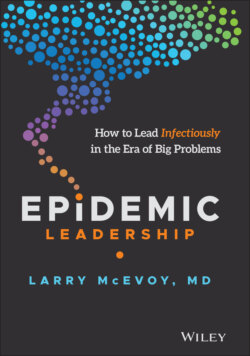Читать книгу Epidemic Leadership - Larry McEvoy - Страница 11
Sleep-Deprived Insight
ОглавлениеAfter the conversation with the nurses, patients began to trickle in as morning arrived. I finished the shift and drove home to where I lived west of town. I opened the ranch gate to our place and paused to take in the land where I lived. It was a quiet ritual of mine that created space between the sights and sounds of my job and the world of my family. Depending on which shift I had just worked, I took a few minutes under the stars or the bright sun to let the insights of the work settle in and to let the sometimes assaulting nature of it wash out onto the ground.
The bright morning air, still cool, held the hint of another hot day, and the slanting sun cast dark shadows on the sun-washed ponderosa coulees and grassy ridges. There is nothing better to wash the olfactory memory of alcohol, blood, urine, and pus from one's brain than the morning smell of sage and Ponderosa pine, nothing better to replace the beeping of monitors and moans of the sick than the breeze wandering in the grassy air. Surrounded by healthier sounds and sights in my sleep-deprived, almost-to-sleep ease, it struck me that the epidemics that cause such ill consequence among us—obesity, cardiovascular disease, HIV, gun violence—were playing by a different set of rules than the ones underlying how I had been taught to respond to them.
I stopped at the corral to feed our two horses. Randomly, my dad's offhand observation about why horses are beautiful wafted across my mind: They've retained their wild shape. We had bought our place six years before, and like so many of the patients I encountered in the emergency department, it was in a degraded state when we found it: overgrazed, eroded, barren of its original biodiversity, its history largely erased. Our hope was to help it heal, and if the ER was an exercise in meeting people in an arc of health that I might never see again, the land was an arc that stayed with me and under my feet, beginning long before me and extending far after. Although the grass crunched yellow in the high summer of a 10-year drought, the ecosystem was surging back to health, not falling behind. Life was recovering here: grasses and shrubs were rebounding, insects and birds were returning, water and soil were recharging. If the ER shift had exhausted me with its physical pace and psychic implications, the sights and smells of the land in the sunny morning inspired and soothed.
I had grown up here in this place of big land and teeming life, raised and surrounded by people who had me in it early and often. I had long wondered how the elegance of biology, so essential to the enduring vitality of every person and every living thing on this planet, did not seem to translate to how we designed organizations, leadership approaches, team dynamics, or even our internal mindsets. The exponential trends that bedeviled me as a doctor and inspired me as a landowner were playing by biological rules; our responses seemed to be so much more mechanical and rigid. And slower. And ineffective. And falling behind.
In the fuzzy haze of near-sleep consciousness I would endure for another 30 minutes before I crashed onto my pillow, a meandering thought surfaced for the first time: if epidemics organize and spread by different, biological rules, what if we could harness the rules and link them to positive realities—to cures, to answers, to ideas, to swarms of positive impact? If I was serious about health, if I was serious about understanding how to multiply adaptive capacity in the face of too much to do and not enough time to do it, I was going to have to answer—positively—the question posed by the epidemics that flowed across the threshold of the ED in that unstoppable wave. How could we create positive phenomena that spread just as powerfully, exponentially, into every nook and cranny, the way epidemics overwhelm our defenses against them?
I wasn't thinking of epidemics as leadership that morning. I only knew at that time that I was on the right side of wanting to be helpful and the wrong side of the way things launched, grew, spread, and moved. From the patients I attended to the land I lived on, I understood biology held vitalizing, relentless capacity. Beyond that, I was out of ideas, and I was too long without sleep.
I went down into the darkest room in my house and fell into the motionless, dreamless sleep of the night worker.
